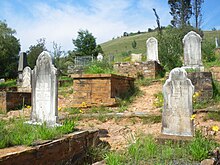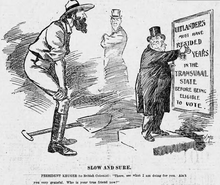
The South African Republic, also known as the Transvaal Republic, was an independent Boer republic in Southern Africa which existed from 1852 to 1902, when it was annexed into the British Empire as a result of the Second Boer War.

The Second Boer War, also known as the Boer War, Transvaal War, Anglo–Boer War, or South African War, was a conflict fought between the British Empire and the two Boer republics over the Empire's influence in Southern Africa.

The Transvaal Colony was the name used to refer to the Transvaal region during the period of direct British rule and military occupation between the end of the Second Boer War in 1902 when the South African Republic was dissolved, and the establishment of the Union of South Africa in 1910. The borders of the Transvaal Colony were larger than the defeated South African Republic. In 1910 the entire territory became the Transvaal Province of the Union of South Africa.
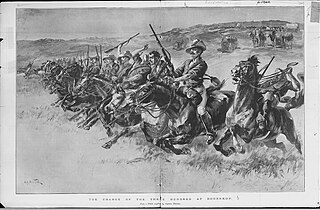
The Jameson Raid was a botched raid against the South African Republic carried out by British colonial administrator Leander Starr Jameson, under the employment of Cecil Rhodes. It involved 500 British South Africa Company police and was launched from Rhodesia over the New Year weekend of 1895–96. Paul Kruger, for whom Rhodes had great personal hatred, was president of the South African Republic at the time. The raid was intended to trigger an uprising by the primarily British expatriate workers in the Transvaal but it failed.
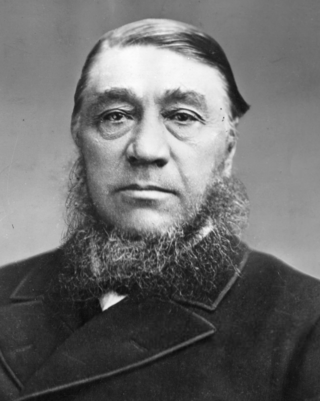
Stephanus Johannes Paulus Kruger, better known as Paul Kruger, was a South African politician. He was one of the dominant political and military figures in 19th-century South Africa, and State President of the South African Republic from 1883 to 1900. Nicknamed Oom Paul, he came to international prominence as the face of the Boer cause—that of the Transvaal and its neighbour the Orange Free State—against Britain during the Second Boer War of 1899–1902. He has been called a personification of Afrikanerdom and admirers venerate him as a tragic folk hero.

The Orange Free State was an independent Boer-ruled sovereign republic under British suzerainty in Southern Africa during the second half of the 19th century, which ceased to exist after it was defeated and surrendered to the British Empire at the end of the Second Boer War in 1902. It is one of the three historical precursors to the present-day Free State province.
The year 1870 in the history of the Cape Colony marks the dawn of a new era in South Africa, and it can be said that the development of modern South Africa began on that date. Despite political complications that arose from time to time, progress in Cape Colony continued at a steady pace until the outbreak of the Anglo-Boer Wars in 1899. The discovery of diamonds in the Orange River in 1867 was immediately followed by similar finds in the Vaal River. This led to the rapid occupation and development of huge tracts of the country, which had hitherto been sparsely inhabited. Dutoitspan and Bultfontein diamond mines were discovered in 1870, and in 1871 the even richer mines of Kimberley and De Beers were discovered. These four great deposits of mineral wealth were incredibly productive, and constituted the greatest industrial asset that the Colony possessed.
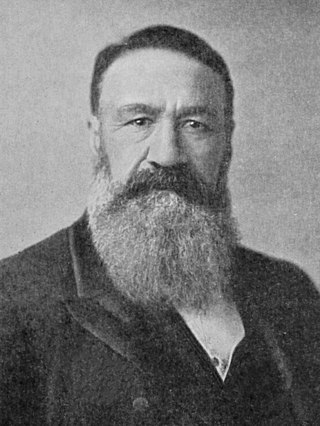
Petrus Jacobus Joubert, better known as Piet Joubert, was Commandant-General of the South African Republic from 1880 to 1900. He also served as Vice-President to Paul Kruger from May 1883 to October 1884 and from May 1896 until his death. He served in First Boer War, Second Boer War, and the Malaboch War.

Johannesburg is a large city in Gauteng Province of South Africa. It was established as a small village controlled by a Health Committee in 1886 with the discovery of an outcrop of a gold reef on the farm Langlaagte. The population of the city grew rapidly, becoming a municipality in 1898. In 1928 it became a city making Johannesburg the largest city in South Africa. In 2002 it joined ten other municipalities to form the City of Johannesburg Metropolitan Municipality. Today, it is a centre for learning and entertainment for all of South Africa. It is also the capital city of Gauteng.

The Witwatersrand Gold Rush was a gold rush that began in 1886 and led to the establishment of Johannesburg, South Africa. It was a part of the Mineral Revolution.

Field Marshal Jan Christian Smuts, OM, CH, ED, KC, FRS was a prominent South African and Commonwealth statesman, military leader, and philosopher. He served as a Boer General during the Boer War, a British General during the First World War and was appointed Field Marshal by King George VI during the Second World War. In addition to various cabinet appointments, he served as Prime Minister of the Union of South Africa from 1919 until 1924 and from 1939 until 1948. From 1917 to 1919 he was one of five members of the British War Cabinet, helping to create the Royal Air Force. He played a leading part in the post-war settlements at the end of both world wars, making significant contributions towards the creation of the League of Nations and the United Nations. He did much to redefine the relationship between Britain and the Dominions and Colonies, leading to the formation of the British Commonwealth.

Sir James Percy FitzPatrick,, known as Percy FitzPatrick, was a South African author, politician, mining financier and pioneer of the fruit industry. He authored the classic children's book, Jock of the Bushveld (1907). As a politician, he defended British Imperial interests before and during the Anglo-Boer War. FitzPatrick is responsible for the creation of the two-minute silence observed on Armistice Day.

The Bloemfontein Conference was a meeting that took place at the railway station of Bloemfontein, capital of the Orange Free State from 31 May until 5 June 1899. The main issue dealt with the status of British migrant workers called "Uitlanders", who mined the gold fields in Transvaal.

The Reform Committee was an organisation of prominent Johannesburg citizens that existed late 1895 and early 1896.

During the Napoleonic Wars, the Cape Colony was annexed by the British and officially became their colony in 1815. Britain encouraged settlers to the Cape, and in particular, sponsored the 1820 Settlers to farm in the disputed area between the colony and the Xhosa in what is now the Eastern Cape. The changing image of the Cape from Dutch to British excluded the Dutch farmers in the area, the Boers who in the 1820s started their Great Trek to the northern areas of modern South Africa. This period also marked the rise in power of the Zulu under their king Shaka Zulu. Subsequently, several conflicts arose between the British, Boers and Zulus, which led to the Zulu defeat and the ultimate Boer defeat in the Second Anglo-Boer War. However, the Treaty of Vereeniging established the framework of South African limited independence as the Union of South Africa.

Sir Lionel Phillips, 1st Baronet was a British-born South African financier, mining magnate and politician.
The South African Republic Police was the police force of the former country, South African Republic, one of two Internationally recognized Boer countries of the mid 19th to early 20th century. The Boers often called the South African Republic by its acronym ZAR while in the English-speaking world the republic was generally known as the Transvaal. Members of the police force were known as ZARPs. After the Union of South Africa was established in 1910, the force was incorporated into the South African Police Force.

The South African Wars, including but also known as the Confederation Wars, were a series of wars that occurred in the southern portion of the African continent between 1879 and 1915. Ethnic, political, and social tensions between European colonial powers and indigenous Africans led to increasing hostilities, culminating in a series of wars and revolts, which had lasting repercussions on the entire region. A key factor behind the growth of these tensions was the pursuit of commerce and resources, both by countries and individuals, especially following the discoveries of gold in the region in 1862 and diamonds in 1867.
The Drifts Crisis of 1895 was an imperial-republican confrontation in South Africa that took place in September and October 1895. It was precipitated by the closing of fords, which in South Africa were known as 'drifts'. The Crisis has traditionally been seen as the precursor to the Jameson Raid and the uncompromising policies of High Commissioner for Southern Africa Alfred Milner which followed, and eventually led to the Second Anglo-Boer War. Historians generally regard the conflicts to have been between the Cape Colony and the South African Republic (SAR), informally known as the Transvaal Republic.
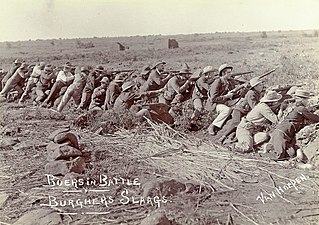
In the Boer Republics of 19th century South Africa, a burgher was a fully enfranchised citizen. Burgher rights were restricted to white men, in particular Boers.
